新概念英语第一册 71、72课件
合集下载
新概念第一册71和72课课件
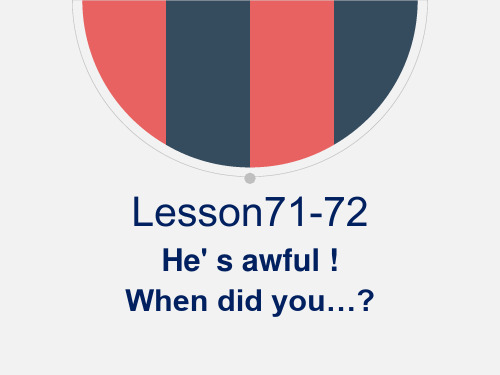
回
顾 动词的过去式表示,其否定句 和各种疑问句靠助动词did构成。
动词过去式的构成
注 意
做
1.一般在动词后直接加-ed)
笔
answer-answered wait---waited
记
2.以不发音的e结尾的动词直接加_d
哦!
telephone---telephoned arrive---arrived
Lesson71-72
He' s awful ! When did you…?
Presentation
I have a friend called Ron Marston. You know, he called me many times yesterday and the day before yesterday. He wanted me to see a movie with him, but I was very busy . Then at last, he called my office. How awful he is!
talk“谈论,谈话” talk about sth. 谈论…
Let's talk about our plan .
talk with sb. 和某人谈话
Lee is talking to his teacher ④ tell vt. “告诉,对某人讲…”
tell sb. sth. = tell sth. to sb.告诉某人… He didn't tell the bad news to little girl.
awful telephone [5C:fEl][5telIfEJn]time
[taIm]
anslawsetr [5B[l:Bn:ssEt]
顾 动词的过去式表示,其否定句 和各种疑问句靠助动词did构成。
动词过去式的构成
注 意
做
1.一般在动词后直接加-ed)
笔
answer-answered wait---waited
记
2.以不发音的e结尾的动词直接加_d
哦!
telephone---telephoned arrive---arrived
Lesson71-72
He' s awful ! When did you…?
Presentation
I have a friend called Ron Marston. You know, he called me many times yesterday and the day before yesterday. He wanted me to see a movie with him, but I was very busy . Then at last, he called my office. How awful he is!
talk“谈论,谈话” talk about sth. 谈论…
Let's talk about our plan .
talk with sb. 和某人谈话
Lee is talking to his teacher ④ tell vt. “告诉,对某人讲…”
tell sb. sth. = tell sth. to sb.告诉某人… He didn't tell the bad news to little girl.
awful telephone [5C:fEl][5telIfEJn]time
[taIm]
anslawsetr [5B[l:Bn:ssEt]
新概念英语NCE1_lesson71-72(共46页)课件
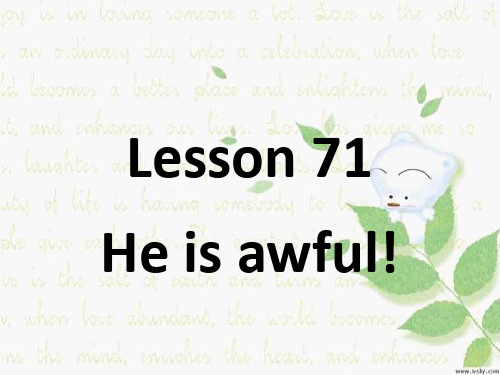
•
New words and
expressions
• awful • telephone • time • answer • last • phone • again • say (said)
adj. 让人讨厌的,坏的 v. & n. 打电话;电话 n. 次(数) v. 接(电话) adj. 最后的,前一次的 n. 电话(=ቤተ መጻሕፍቲ ባይዱelephone) adv. 又一次地 v. 说
玛丽拖了几分钟时间才去开门。 Mary took a few minutes to answer the door.
② v. 回答;答复 answer a letter 回信 我认为你没有回答我的问题。
I don’t think you’ve answered my
question.
③ n. 答案;解决办法;答复 • 我给他写了好几封信,可都没
• once,twice,three times
•on time 按时,准时 •in time 及时 •all the time 一直 •once upon a time 很久很久以前
★answer v. 接(电话)
① v. 对……作出反应;响应
• answer the phone/telephone 接电话 • answer the door/doorbell 应声开门
★awful
adj. 让人讨厌的, 坏的
• awfully adv. 非常 • (在表示负面的情景中,可用
awfully代替very) I am awfully (very) sorry.
★time n. 次(数)
• time在英语中作不可数名词时表示“时 间”;作可数名词时表示“次数”,三次 或三次以上通常用基数词+times表示:
New words and
expressions
• awful • telephone • time • answer • last • phone • again • say (said)
adj. 让人讨厌的,坏的 v. & n. 打电话;电话 n. 次(数) v. 接(电话) adj. 最后的,前一次的 n. 电话(=ቤተ መጻሕፍቲ ባይዱelephone) adv. 又一次地 v. 说
玛丽拖了几分钟时间才去开门。 Mary took a few minutes to answer the door.
② v. 回答;答复 answer a letter 回信 我认为你没有回答我的问题。
I don’t think you’ve answered my
question.
③ n. 答案;解决办法;答复 • 我给他写了好几封信,可都没
• once,twice,three times
•on time 按时,准时 •in time 及时 •all the time 一直 •once upon a time 很久很久以前
★answer v. 接(电话)
① v. 对……作出反应;响应
• answer the phone/telephone 接电话 • answer the door/doorbell 应声开门
★awful
adj. 让人讨厌的, 坏的
• awfully adv. 非常 • (在表示负面的情景中,可用
awfully代替very) I am awfully (very) sorry.
★time n. 次(数)
• time在英语中作不可数名词时表示“时 间”;作可数名词时表示“次数”,三次 或三次以上通常用基数词+times表示:
新概念英语一册第71-72课件
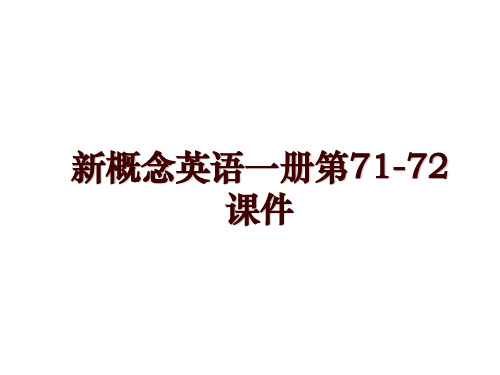
and yesterday afternoon. My boss answered the telephone.
telephone/ call sb the answer to the question 问题的答案 打电话
JANE: What did your boss say to him? PAULINE: He said, "Pauline is typing letters.
JANE: What's Ron Marston like, Pauline? PAULINE: He's awful!
He telephoned me four times yesterday, and three times the day before yesterday. PAULINE: He telephoned the office yesterday morning
PAULINE: Yes, he did. He telephoned at nine
o'clock.
JANE: _W__h_a_tdid _y_o_u__ say to him?
PAULINE: I said, 'This isP_a_u_l_in_e_'_s_ mother.
Please don't _t_e_le_p_h_o__nemy daughter again!'
• 7.在左边
on the left
• 8.在比赛中
in the race
• 9.一场激动人心 an exciting finish 的结尾
• 10.在回家的路 on the way home 上
课文拓展
• There is (be的适当形式 ) a car race near our town every year. • In 1995, there was (be的适当形式 ) a very big race. • There were hundreds of people (数以百计的… ) there. • My wife and I were (be的适当形式 ) at the race. • Our friends Julie and Jack were (be的适当形式 ) there, too. • You can see us (we的适当形式 ) in the crowd. • We are standing (stand的适当形式 ) on the left. • There were (be的适当形式 ) twenty cars in the race. • There were (be的适当形式 ) English cars, French cars, German cars,
telephone/ call sb the answer to the question 问题的答案 打电话
JANE: What did your boss say to him? PAULINE: He said, "Pauline is typing letters.
JANE: What's Ron Marston like, Pauline? PAULINE: He's awful!
He telephoned me four times yesterday, and three times the day before yesterday. PAULINE: He telephoned the office yesterday morning
PAULINE: Yes, he did. He telephoned at nine
o'clock.
JANE: _W__h_a_tdid _y_o_u__ say to him?
PAULINE: I said, 'This isP_a_u_l_in_e_'_s_ mother.
Please don't _t_e_le_p_h_o__nemy daughter again!'
• 7.在左边
on the left
• 8.在比赛中
in the race
• 9.一场激动人心 an exciting finish 的结尾
• 10.在回家的路 on the way home 上
课文拓展
• There is (be的适当形式 ) a car race near our town every year. • In 1995, there was (be的适当形式 ) a very big race. • There were hundreds of people (数以百计的… ) there. • My wife and I were (be的适当形式 ) at the race. • Our friends Julie and Jack were (be的适当形式 ) there, too. • You can see us (we的适当形式 ) in the crowd. • We are standing (stand的适当形式 ) on the left. • There were (be的适当形式 ) twenty cars in the race. • There were (be的适当形式 ) English cars, French cars, German cars,
新概念第一册71-72课课件

Don’t blame me!
I promise it will not happen again.
6. There is no reason for complaints.
* complaint 抱怨,不满
7. He is ready to take the blame for the accident.
表达沮丧之情
1. I’m depressed. 我很沮丧 We all lose heart. 我们都泄气了
2. I don’t feel like doing anything. I don’t want to work now. I want to ask for leave.
3. John looks sad. 4. I blew it.
★answer v. 接(电话) ① v. 对……作出反应;响应
• answer the phone/telephone 接电话 • answer the door/doorbell 应声开门 • 玛丽拖了几分钟时间才去开门。
Mary took a few minutes to answer the door. ② v. 回答;答复 • answer a letter 回信 • 我认为你没有回答我的问题。
结束语
谢谢大家聆听!!!
27
* fling 扔、抛 3. Do you have a reason for being late? =Why are you late?
There is a traffic jam. My watch doesn’t work, so I was late.
4. Please do it all over again.
• what’s … like? 什么怎么样? 你们国家的天气怎么样?
新概念英语一册第71-72课件

tonight
last night
the night before last
一般过去时的练习
She is airing the room now. She aired it yesterday. rained 1. It is raining now. It yesterday. 2. It is snowing now. It snowed yesterday. 3. He is boiling some eggs. He boiled some yesterday. 4. We are enjoying our lunch. We enjoyedit yesterday, too.
如: He didn’t telephon me four times yesterday.
本课重点语法
本课重点语法
一般过去过的几种基本句型 3.) 一般疑问句及其回答:
Did +主语+动词原形+其它?句末用问号。 肯定回答:yes, …did. 否定回答:No, …didn’t.
本课重点语法
一般过去时(II)句型:例句 如: 陈述句:I walked to school yesterday. 否定句:I didn’t walk to school yesterday.
注 意 做 笔 记 哦!
一般过去时的练习
air--- aired clean-- cleaned open-- opened arrive-- arrived shave-- shaved live-- lived type-- typed climb-- climbed call--called
注 意 做 笔 记 哦!
本课重点语法
新概念英语NCE1_lesson71-72(共24页)课件

He telephoned at nine o'clock. Jane: What did you say to him? PAULINE: I said, 'This is Pauline's mother. Please don't telephone my daughter again!' Jane: Did he telephone again? PAULINE: No, he didn't!
PAULINE: He telephoned the office yesterday morning and yesterday afternoon. My boss answered the telephone. JANE: What did your boss say to him? PAULINE: He said, "Pauline is typing letters. She can't
He boiled some yesterday. 4. We are enjoying our lunch.
We enjoyed it yesterday, too.
she/air the room/ yesterday What did she do yesterday? She aired the room yesterday.
3. I’m watching my time. of the time 当时 make time 腾出时间 4.Time will tell. 时间会证明一切。 5.Time and tide wait for no man. 岁月不等人。 6.Time heals all wounds. 时间会治愈所有的创伤。
新概念英语NCE1_lesson71-72(共13页)课件

形式及否定形式) answer the phone! • Did (do的适当形式) he telephone again last night? (并做肯定回答)
• Yes, he did.
• He telephoned (telephone的适当形式) at nine o'clock.
• What did (do的适当形式) you say to him?
您身边的小升初英语专家----鑫鹏学校新概念部
课文再现-英汉互译
• He‘s awful!
• Then I arrived home at six o'clock
• 他讨厌透了!
• What's Ron Marston like, Pauline? • 朗·马斯顿是怎样一个人?
• He telephoned me four times yesterday,
• 前天打了3次。
• He telephoned the office yesterday morning and yesterday afternoon.
• 他昨天上午和下午把电话打到了我的办 公室,
• My boss answered the telephone • 是我的老板接的。
• He said,‘Pauline is typing letters. • 他说:“波琳正在打信,
• What did she do yesterday? • She aired the room yesterday.
• 1 they/ clean their shoes/ yesterday • 2 he/ open the box/ last night • 3 they/ sharpen their pencils/ this morning • 4 she /turn on the television/this evening
• Yes, he did.
• He telephoned (telephone的适当形式) at nine o'clock.
• What did (do的适当形式) you say to him?
您身边的小升初英语专家----鑫鹏学校新概念部
课文再现-英汉互译
• He‘s awful!
• Then I arrived home at six o'clock
• 他讨厌透了!
• What's Ron Marston like, Pauline? • 朗·马斯顿是怎样一个人?
• He telephoned me four times yesterday,
• 前天打了3次。
• He telephoned the office yesterday morning and yesterday afternoon.
• 他昨天上午和下午把电话打到了我的办 公室,
• My boss answered the telephone • 是我的老板接的。
• He said,‘Pauline is typing letters. • 他说:“波琳正在打信,
• What did she do yesterday? • She aired the room yesterday.
• 1 they/ clean their shoes/ yesterday • 2 he/ open the box/ last night • 3 they/ sharpen their pencils/ this morning • 4 she /turn on the television/this evening
新概念第一册71课PPT课件
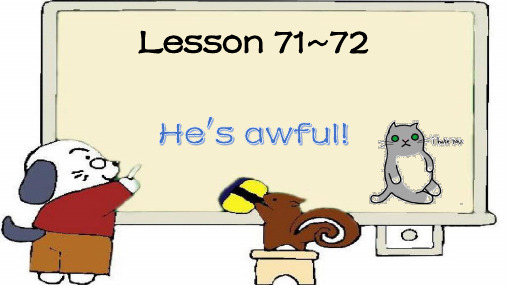
e.g. 我不记得他的电话号码。 I can't remember his telephone number.
time
n. 时间(不可数)
e.g. 你现在有时间吗? Do you have time now?
e.g. 我没时间做它。 I have no time to do it.
n. 次数(可数) 基数词+times 表示几次(两次以上)
一次 两次 三次 六十次
oHale Waihona Puke e timetwo times
three times
sixty times
once twice
序数词+time 表示第几次
the first time the second time the third time
all the time I looked for my book everywhere, and it was in my bag all the time.
Hello. Who is that? /Who is calling,please?
I'm Yvonne. Are you Lucy? This is Yvonne(speaking). Is that Lucy?
学习总结
经常不断地学习,你就什么都知道。你知道得越多,你就越有力量 Study Constantly, And You Will Know Everything. The More
You Know, The More Powerful You Will Be
结束语
当你尽了自己的最大努力时,失败也是伟大的, 所以不要放弃,坚持就是正确的。
When You Do Your Best, Failure Is Great, So Don'T Give Up, Stick To The End 演讲人:XXXXXX 时 间:XX年XX月XX日
新概念一第71-72课课件(完整版)
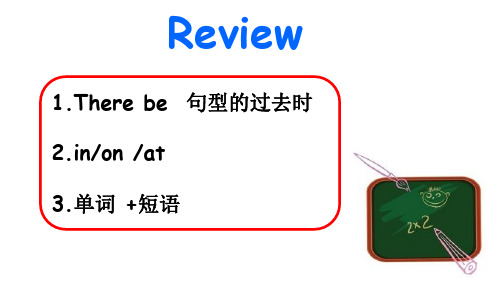
对以下句子的地点进行提问: • I am going to type the letter at home
tomorrow .
• I was at Lily's house last night .
小结:
1:划出句子中所要提问的部分。 2.when /where +然后把剩下的部分改成 一般疑问句
对以下句子的时间进行提问: • I am going to type the letter tomorrow .
• The teacher is busy(忙的) now .
• I was at Lily's house last night .
对“地点”的提问?
• in the classroom
PAULINE: He said, "Pauline is typing letters. She can't speak to you now!"
PAULINE: Then I arrived home at six o'clock yesterday evening.
He telephoned again. But I didn't answer the phone!
last [lɑ:st]
1) I was last in the car race . 2) I was at home last night .
time [taim]
1) What's the time ?
2)He telephoned me 4 times last night .
again [ə'ɡen]
e.g.I'm at home on weekends. When are you at home ?
新概念英语第一册 71-72课 47张PPT
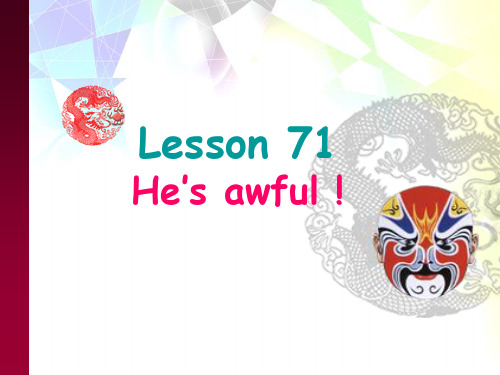
拓展:
once upon a time 很久很久以前
cheat the time 打发时间
We are cheating the time cards. 我们通过打牌打发时间。
watch one’s time 等待时机
I’m watching my time.
by playing
Words:
★ answer [ˈɑ:nsə] v. 接(电话)
① v. 对……作出反应;响应 answer the phone/telephone 接电话 answer the door/doorbell 应声开门 Mary take a few minutes to answer
the door. 玛丽拖了几分钟时间才去开门。
② v. 回答;答复
answer a letter 回信
I didn’t think you answered my question. 我认为你没有回答我的问题
③ n. 答案;解决办法;答复
I wrote him several letters but couldn’t get an answer. 我给他写了好几封信,可都没有回音。
Do you know the answer to Question 10? 你知道第10题的答案吗?
adj. 让人讨厌的,坏的 v. & n. 打电话;电话
n. 次(数);时间 v. 接(电话);回答
Words:
last [lɑ:st] phone [fəun] again [əˈɡein] say (said) [sei][sed]
adj. 最后的,前一次的 n. 电话(=telephone) adv. 又一次地 v. 说
新概念一第L71-72-课课件
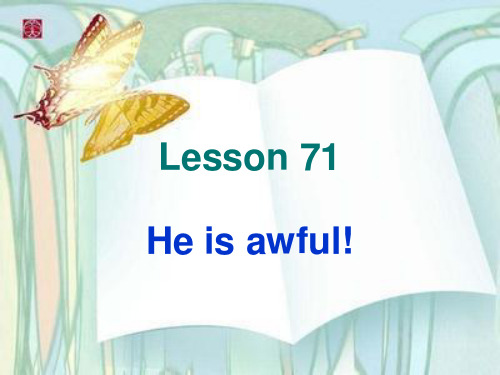
They climbed the tree yesterday. They didn’t climb the tree yesterday
She listened to music yesterday. Did she listen to music yesterday?
He op变en一ed般th疑e b问ox:ye无st情erd无ayb. e提助动 Did he一op般en过th去e b时ox:ye助dstied动r提dda前yid?谓提还句原首。,
JANE: What did you say to him? PAULINE: I said, ‘__T_h_is___ is Pauline's mother.
Please don't telephone my daughter _a_g_a_in__!’
JANE: Did he telephone again? PAULINE: No, _H_e__d_id_n_’t_!
Bell American
telephone cell phone
New Words
aHale Waihona Puke ful ['ɔːfʊl] adj. 让人讨厌的,坏的
telephone ['telɪfəʊn] v. & n. 打电话;电话
time
[taɪm] n. 次(数)
answer ['ɑːnsə] v. 接(电话)
我非常抱歉。 I am awfully (very) sorry.
time n. 次(数)
1. 时间 (不可名) What’s the time? on time 准时 in time 及时
2. 次数(可数名词) 一次: once, 两次: twice, 三次或三次以上:基数词+times three times ten times
She listened to music yesterday. Did she listen to music yesterday?
He op变en一ed般th疑e b问ox:ye无st情erd无ayb. e提助动 Did he一op般en过th去e b时ox:ye助dstied动r提dda前yid?谓提还句原首。,
JANE: What did you say to him? PAULINE: I said, ‘__T_h_is___ is Pauline's mother.
Please don't telephone my daughter _a_g_a_in__!’
JANE: Did he telephone again? PAULINE: No, _H_e__d_id_n_’t_!
Bell American
telephone cell phone
New Words
aHale Waihona Puke ful ['ɔːfʊl] adj. 让人讨厌的,坏的
telephone ['telɪfəʊn] v. & n. 打电话;电话
time
[taɪm] n. 次(数)
answer ['ɑːnsə] v. 接(电话)
我非常抱歉。 I am awfully (very) sorry.
time n. 次(数)
1. 时间 (不可名) What’s the time? on time 准时 in time 及时
2. 次数(可数名词) 一次: once, 两次: twice, 三次或三次以上:基数词+times three times ten times
新概念第一册71和72课ppt课件
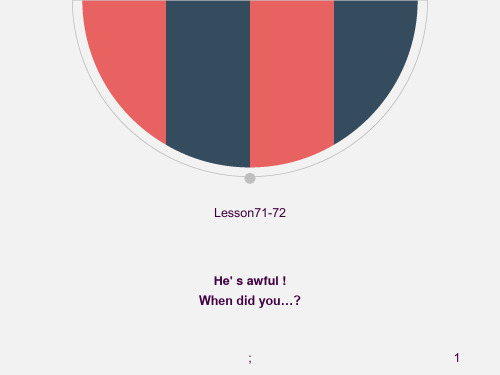
;
20
;
14
本课重点语法 一般过去过的几种基本句型
1.) 肯定句:主语+过去式+其它 如:He telephoned me four times yesterday.
2.) 否定句:主语+didn’t+动词原形+其它 如: He didn’t telephon me four times yesterday.
What's the climate like in your country?
What's the weather like in spring? 2、speak to sb. 与某人说话
May I speak to Pauline, please?
I’d like to speak to Pauline, please. 在电话中回答:This is…. 3、pretend as/to be 假装… 装作…
Lesson71-72
He' s awful ! When did you…?
;
1
New Words:
★awful adj. 让人讨厌的,坏的 awfully adv. 非常(在表示负面的情景中, 可用awfully代替very) 例句:I am awfully (very) sorry.
;
2
★time n. 次(数)- cn.
She pretended herself as her mother.
;
8
;
9
一般过去时(I)
Lesson 68, 70
概念:表示过去某一时间发生的动作或存在的状态,通常以动
语
词的过去式表示,其否定句和各种疑问句靠助动词did构成。
- 1、下载文档前请自行甄别文档内容的完整性,平台不提供额外的编辑、内容补充、找答案等附加服务。
- 2、"仅部分预览"的文档,不可在线预览部分如存在完整性等问题,可反馈申请退款(可完整预览的文档不适用该条件!)。
- 3、如文档侵犯您的权益,请联系客服反馈,我们会尽快为您处理(人工客服工作时间:9:00-18:30)。
•逆时表达 3:50 ten to four 一刻钟/半点 5:15 a quarter past five 6:30 half past six 半小时之前用past 7:10 ten past seven 8:16 sixteen past eight 半小时以后用to 2:40 twenty to three 4:50 ten to five
Shedding tears 2012
A graduate becomes emotional at Fudan University in Shanghai, June 29, 2012.
Let’s review.
1.Time 时间表示法 •整点表示 1:00 one o’clock
•顺时表达 3:10 three ten
一般过去时动词变化规则
①直接加ed work—— worked look——looked play——played, ②以不发音e结尾的单词,直接加d live ——lived hope——hoped use——used, ③以辅音字母+y结尾的,变y为i加ed study—— studied carry——carried worry——worried, ④以元音字母+y结尾的,直接加ed enjoy ——enjoyed play——played
Shedding tears 2012
A baby cries while having his hair cut for Dragon Head-raising Day in Luoyang, Henan province, Feb 23, 2012, which marks the traditional Chinese festival Long Tai Tou (dragon head raising) and the start of spring and farming. During the festival, held on the second day of the second month of the lunar calendar, people play dragon lanterns, eat noodles, shave their heads, and pray for luck.
4.Do you have any plan in your winter holiday? Have a trip? Stay at home? Have some classes?
Enjoy the pictures
Shedding tears 2012
A woman becomes emotional after learning that her husband died in a deadly flood in Beijing, July 23, 2012.
he always carried an umbrella.
常用时间
常与一般过去时态连用的时间有:
yesterday,
the other day, just now last night (week, month, year…) two days ago, a week ago, in 1990, (in 1998…) three years ago…
When I was 5 years ago
be 动词的过去时:
肯定句 否定句 疑问句
主语 + be动词的过去式(was, were)~ . 主语 + be动词的过去式(was, were)+ not ~ . be 动词的过去式(was, were)+主语 ~ ?
Hale Waihona Puke He was busy yesterday. He was not busy yesterday.
Jan, 11th , 2013
Oral English Time
1.Hei,long time no see! How’s everything?
2.Where did you go in the holiday?
3.How about your final exams? Good or bad?
What's Ron Marston like, Pauline?
What is sb. like? 询问某人的外貌或品行。
你爸爸这个人怎么样? What's your father like?
what’s … like? 什么怎么样?
你们国家的天气怎么样?
What's the climate like in your country?
③ n. 答案;解决办法;答复 • 我给他写了好几封信,可都没有回音。 I wrote him several letters but couldn’t get an answer. • 你知道第十题的答案吗? Do you know the answer to Question 10? • This is one of the possible answers to today’s environmental problems. 这是有可能解决当今环境问题的办法 之一。
• 我一直在这里等着。 I’ve been waiting here all the time. • 时间会证明一切。 Time will tell. • 岁月不等人。 Time and tide wait for no man. • 时间会治愈所有的创伤。 Time heals all wounds.
at the butcher’s;at the office
②用介词in的时间短语:
一天中的某段时间(in the evening) 月份(in March) 年份(in 1997) 季节(in spring) 世纪(in the 20th century) 节日(in Easter week【时间长的】) 时期(in the holidays) 3.Let’s do the exercise at page 140.
一般过去时的用法 1、表示过去某个时间发生的动作或存在的状态。
He was at home yesterday. I got up at six thirty yesterday morning. I visited my aunt last weekend.
2、表示过去经常或反复发生的动作。
My father often went to work by bus last year. When I was a child, I often listened to music.
【in】是“大姐”,因 为后面所接的都是较长 时间(月、年、季节 等)。 【on】是 “二姐”,后 面所接的时间多与日期 有关(星期、日期、具 体时间、纪念日等)。 【at】是“小妹”,因 为接在后面的时间最短 (具体时刻或某短暂时 间)。
New words
•awful /ˈ ɔ:ful/ /ˈ ɔfəl/ adj. •Telephone /ˈtelif əun/ /ˈt ɛləˈfon/ v. & n. •time /taɪm/ n. •answer /ˈ ɑ:nsə/ /ˈæns/ ɚ v. •last /lɑ:st/ /læ st/ adj. •phone /fəun/ n. •again /əˈ ɡen/ /əˈ ɡɛn/ adv. •say /sei/ v.
Shedding tears 2012
Wu Naiyi, 83, was widely praised after he insisted on repaying 800,000 yuan ($127,840) in debt left behind by his three sons after they died in a typhoon disaster. Wu, from Wenzhou, East China’s Zhejiang province, has refused to accept donations from the public and managed to clear the debt in six years, despite his grief, illness and age.
Shedding tears 2012
A girl cries on her first day of kindergarten in Nanchang, Jiangxi province, Sept 3, 2012.
Shedding tears 2012
Survivor Peng Jueyue, 82, hides her face while talking about the loss of her mother during the bombing of Chongqing by Japanese forces in 1939, in Chongqing, Sept 13, 2012.
Let’s start to learn the passage. Answer several questions:
• Why Pauline thinks that Ron is awlful? • How many times did Ron telephone Pauline? • When did Ron telephone her at night? • How did her solve this problem? • Did Ron call her any more?
★answer v. 接(电话) ① v. 对……作出反应;响应 • answer the phone/telephone 接电话 • answer the door/doorbell 应声开门 • 玛丽拖了几分钟时间才去开门。 Mary took a few minutes to answer the door. ② v. 回答;答复 • answer a letter 回信 • 我认为你没有回答我的问题。 I don’t think you’ve answered my question.
